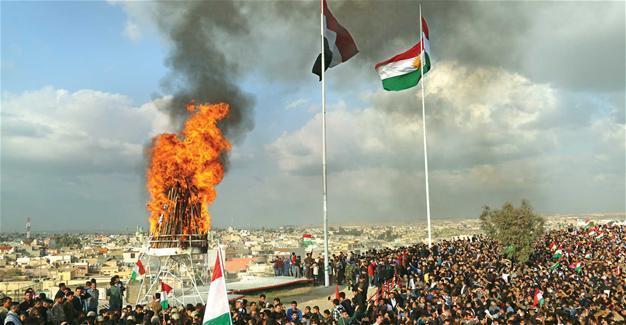Time for an ‘amicable divorce’ between Iraqi Kurds, Baghdad: KRG spokesperson
Cansu Çamlıbel - ISTANBUL
 The time has come for the Iraqi Kurdistan Regional Government (KRG) and Baghdad to start discussing an “amicable divorce,” according to a spokesperson for the Kurdish autonomous region.
The time has come for the Iraqi Kurdistan Regional Government (KRG) and Baghdad to start discussing an “amicable divorce,” according to a spokesperson for the Kurdish autonomous region.“We should enter a serious dialogue with Baghdad to reach an amicable solution – an amicable solution for divorce,” KRG spokesperson Safeen Dizayee recently told daily Hürriyet.
“We can be two good neighbors. This is something we want as the only way,” he added.
“The principle of consensus was something all sides agreed on [in 2003], but now that principle is no longer there. It is a majority-minority vote. So even if Kurds have 65 seats in Baghdad, we will always be the minority,” he said.
The central administration has also been blocking the KRG’s share in the budget, Dizayee said.
“We are always at the mercy of Baghdad and this is why we are looking to find another formula. Our budget has been cut; there is no assistance for the military. These show that we cannot work together. There is an Iraq before Mosul and post-Mosul. This is why we have to seek a solution for stability. The only way forward is to go for an independent entity in Iraqi Kurdistan,” the spokesperson said.
According to Dizayee, the only way to achieve that target is through dialogue.
“We need to enter serious conversations first with Baghdad before anybody else,” he said.
“Then hopefully with our other neighbors so that they do not see this newborn entity as a threat to their security and stability. We are talking about the borders of Iraqi Kurdistan alone. We have no ambitions of a territory in Iran, Syria and Turkey,” he said.
Ankara has always opposed any sort of independent Kurdistan, highlighting Iraq’s territorial integrity. Dizayee said the issue was never raised officially with Turkey, and a talk may be possible after the April 16 referendum.
“The referendum is only a couple of weeks away,” he said. “I don’t think it is too much of a time in a nation’s history. We are ready to wait. For sure we have to talk with Turkey.”
The United States has not endorsed Iraqi Kurds’ independence ambitions either, but according to Dizayee, the real concern for the U.S. is to have a strong Iraq in the region.
“Iraq is a strategically important country for them,” he said.
“But if you do not address the Kurdish issue in Iraq, Iraq will never be stable. The present Iraq is far from being stable. Years ago, a very senior American official said in a discussion with one of our politicians that he envisaged a strong, centralized Iraq. Our friend asked him, ‘In that case, why did you remove Saddam?’ After Saddam, you will never have a strong centralized government, never. It can only happen under a dictatorship,” he said.
Dizayee said the possible independence of the KRG would not set an example for Kurds in the Middle East, especially for Syrian Kurds.
“They are totally different,” the spokesperson said.
“First the Kurds’ progress in Iraq has been continuing almost uninterrupted since World War I in Iraq. We have a legal status as an autonomous region. The Kurdish leadership in Iraq has been received at the White House, Downing Street, Elysee and Beştepe [Ankara]. There is a de facto recognition. I do not think you can draw a parallel with the [outlawed Kurdistan Workers’ Party] PKK or Syrian Kurds. This luxury for Syrian Kurds will not last long, unfortunately. We encourage them to be more realistic. We also encourage the PKK to be more pragmatic to open doors with other opposition groups,” Dizayee said, adding that he still saw a possibility for a peace process between Turkey and the PKK “not immediately, but in the future,” with a possible role for KRG leader Massoud Barzani.
“If all sides accept such a role, I am sure we will be eager to contribute – particularly because he has a lot of respect among Kurds in Turkey,” Dizayee added.
















